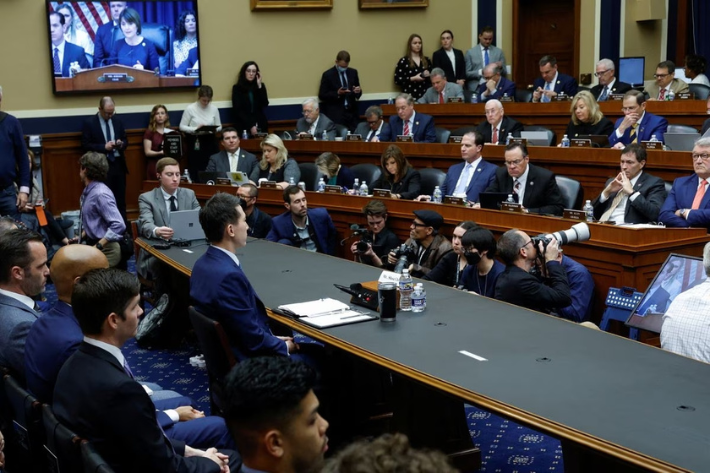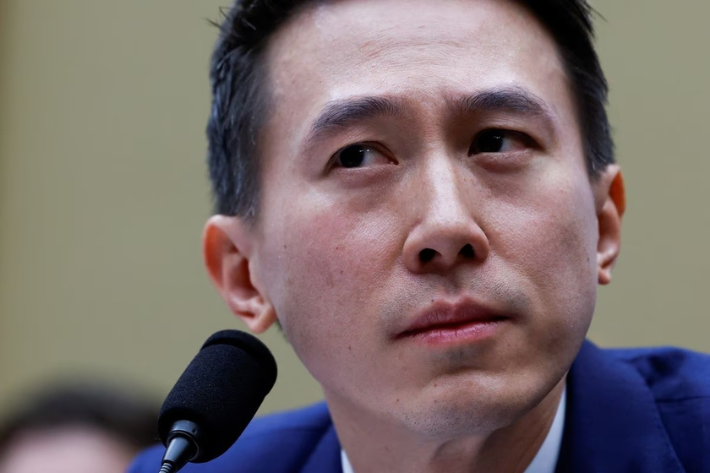China’s foreign ministry on Friday slammed a Congressional hearing which saw TikTok CEO Shou Zi Chew being hammered by US lawmakers over potential Chinese influence over the platform and its impact on children’s mental health.
Beijing had never asked companies to collect or provide data from abroad to the Chinese government in a way that violated local laws, foreign ministry spokesperson Mao Ning said at a regular briefing. The US was presuming TikTok’s guilt and “unreasonably suppressing” the company, she said.
TikTok is not available in China, where ByteDance offers a Chinese equivalent Douyin. Still, the hearing was closely watched in the country. Related news posts gathered millions of views on microblogging site Weibo where many users expressed sympathy for Chew and criticised US “hostility”.
Also on AF: TikTok Facing US Ban if Chinese Owners Don’t Sell Stakes
Hu Xijin, a former editor-in-chief of state-run tabloid Global Times, said in a tweet on Thursday: “The US is robbing TikTok this time, but it is hypocritically going through the process of a hearing.”
In the charged hearing on Thursday, Chew repeatedly denied the app shares data or has connections with the Chinese Communist Party. He argued the platform was doing everything to ensure safety for its 150 million American users.
But Chew’s over five hours of testimony did little to assuage US worries over TikTok’s China-based parent company ByteDance and added fresh momentum to lawmakers’ calls to ban the platform nationwide.
‘American data on American soil’
Chew began his testimony by referring to his Singaporean roots, and said: “We do not promote or remove content at the request of the Chinese government.”
He added: “It is our commitment to this committee and all our users that we will keep [TikTok] free from any manipulation by any government.”
Chew said TikTok for more than two years has been “building what amounts to a firewall to seal off protected US user data from unauthorised foreign access. The bottom line is this: American data stored on American soil, by an American company, overseen by American personnel,” he added.
But critics were not appeased as the company failed to announce any new efforts to safeguard privacy.
TikTok says it has spent more than $1.5 billion on data security efforts under the name “Project Texas” which currently has nearly 1,500 full-time employees and is contracted with Oracle to store the app’s US user data.
Heated privacy debate
TikTok last week said the Biden administration demanded its Chinese owners divest their stakes or face a potential ban.
When asked about a potential divestiture, Chew said the issue was “not about the ownership”. He argued US concerns could be addressed by moving data to its US storage centres.
China’s commerce ministry said forcing TikTok’s sale “will seriously damage the confidence of investors from all over the world, including China, to invest in the United States,” and that China would oppose any sale.
Some lawmakers cited China’s comments to reject TikTok’s contention that it is separate from the Chinese government.

Representative Neal Dunn asked Chew if ByteDance has spied on Americans at Beijing’s request. Chew answered, “No.”
Dunn then asked about US media reports that a China-based team at ByteDance planned to use TikTok to monitor the location of specific US citizens. He then repeated his question about whether ByteDance was spying.
“I don’t think that spying is the right way to describe it,” Chew said. He went on to describe the reports as involving an “internal investigation,” but was cut off by Dunn, who called TikTok’s widespread use “a cancer.”
TikTok ‘leading to death’
Not a single US lawmaker offered support for TikTok. They deemed Chew’s answers on China evasive and aired concerns over the power the app holds over US children.
Representative Diana DeGette, a Democrat, said TikTok’s efforts to prevent the spread of misinformation on the platform were not working.
“You gave me only generalised statements that you’re investing, that you’re concerned, that you’re doing work. That’s not enough for me. That’s not enough for the parents of America,” DeGette said.
Representative Gus Bilirakis showed the committee a collection of short TikTok videos that appeared to glorify self-harm and suicide, or outright tell viewers to kill themselves.
“Your technology is literally leading to death,” Bilirakis said. “We must save our children from big tech companies like yours, who continue to abuse and manipulate them for your own gain.”
Chew told Bilirakis that TikTok takes the issue of suicide and self-harm “very, very seriously.”
‘Save our children’
Democratic lawmaker Tony Cardenas said Chew was a “good dancer with words”. He accused Chew of avoiding tough questions on evidence that the app has harmed children’s mental health.
Chew said the company was investing in content moderation and artificial intelligence to limit such content. He said the app strictly screens content that could harm children.
Others accused TikTok of promoting content that encourages eating disorders among children, illegal drug sales and sexual exploitation.
“TikTok could be designed to minimise the harm to kids, but a decision was made to aggressively addict kids in the name of profits,” said Representative Kathy Castor, a Democrat, at the House of Representatives Energy and Commerce committee hearing.
Chew responded to many pointed questions by saying the issues were “complex” and not unique to TikTok.
Ban rumours ‘exaggerated’
The hearing comes at a time when US lawmakers are pushing for a nationwide ban on the short video app.
Some 20 US senators – 10 Democrats and 10 Republicans – have backed bipartisan legislation giving President Joe Biden’s administration a path to ban TikTok. The app’s fate has added a new element to tensions between Washington and Beijing.
It is not clear how lawmakers will proceed after the hearing or how quickly they might move to pass legislation to strengthen the Biden administration’s legal powers to ban TikTok.
Shares of US social media companies that compete with TikTok for advertising rose on Thursday. Facebook parent Meta closed 2.2% higher, while Snap climbed up 3.1%.
“SNAP and META are up on [the] idea that the CEO didn’t do well and TikTok may be banned,” said Thomas Hayes, chairman and managing member of Great Hill Capital. “I think the rumours of TikTok’s demise may be greatly exaggerated.”
- Reuters, with additional editing by Vishakha Saxena
Also read:
US Senators’ TikTok Banning Bill Earns White House Backing
TikTok Row: China Says US Seeks to Curb its Right to Develop
US and Canada Order TikTok Cut From All Government Phones
TikTok Plans More Data Centres in Europe Amid Security Concerns
China’s TikTok Fined $5.4m Over Online Tracking Breach
























